The Struggles Women Face in Friendships, Based On Their Myers-Briggs® Personality Types
As an INTJ woman, I have often experienced uncertainty and intimidation when it comes to the realm of female friendships. While I do know some other NT women who do not face the same struggle, I have noticed that many others do encounter similar challenges. Building and maintaining friendships can be challenging, particularly as an adult, and each personality type faces their own unique hurdles. For instance, an ENFJ may find themselves pulled in multiple directions by the diverse needs of their friends, while an INTP might feel overwhelmed by social expectations that they struggle to fully comprehend.
What is your friendship struggle?

What do you love and hate about friendship?
That’s what we’re exploring in today’s article. And hopefully you’ll come away from this article feeling a little less alone.
Let’s get started!
The Struggles Women Face in Friendship, Based On Their Myers-Briggs® Personality Type
The ISTJ Woman
Valued for her steadfastness and loyalty, the ISTJ woman has a serious and no-nonsense demeanor. She craves a few close friends, but she may find it challenging to navigate the emotional dynamics that seem to come naturally to others. The concept of a “girl world,” where laughter, mirroring, and constant support prevail, can feel foreign to her. Her logical and direct communication style, coupled with her serious demeanor, may make her appear less emotionally supportive than she really is.
It’s important to note that while ISTJs can be empathetic and supportive, their emotions may not always be apparent on their faces. Instead they express support through troubleshooting, problem-solving, and offering logical advice. This style of support is sometimes viewed as less caring compared to the traditional “warm and fuzzy” approach of other personality types.
However, an ISTJ’s straightforward and logical manner is not any less loving than the “warm and fuzzy” kind. Different personality types show their love and compassion in unique ways. ISTJs demonstrate their love by helping others solve the underlying problems they’re facing. While a hug may provide temporary comfort, a solution lasts forever.
Behind an ISTJ’s serious and direct approach lies a deep well of love and compassion. They take the time to truly understand your needs and concerns, carefully analyzing every aspect to provide the most effective and lasting solution. It’s not just about offering a quick fix; it’s about creating a long-term impact.
So, the next time you encounter an ISTJ woman who offers you some advice, remember that her approach is rooted in love and compassion. She’s ready to support and uplift you in a way that will have a lasting and meaningful effect.
Find out more about ISTJs: 12 Amazing Fictional ISTJ Characters
The ISFJ Woman
The ISFJ woman is often described as warm, caring, and supportive. She easily takes on the role of a confidante or helper in time of need. ISFJs are deeply loyal to their friends and will go out of their way to provide emotional support whenever possible.
However, the ISFJ’s kindness can sometimes be taken advantage of by those who exploit her generosity. She is eager to help, and she may be too giving to others; putting her own needs on the backburner. A lack of boundaries can often lead to her feeling drained or taken for granted.
While ISFJs are often people-pleasers at heart, they are not doormats. They must set clear boundaries and know their limits if they want to be successful in friendships. And while they are loyal, there comes a point where they’ve just had too much and need to step back.
Another struggle ISFJ women face in friendships is the friend-making stage. ISFJs are often shy and reserved at first, and the idea of going to social gatherings can feel overwhelming – especially if they don’t know anyone. Often, ISFJs will stick to friends they’ve had since childhood, and if they find themselves in a new location or having to start over in this stage, they can feel lost and alone. They may prefer to stay at home and pursue their own independent hobbies then put themselves in the uncomfortable position of meeting new people.
For any ISFJs reading this who are struggling with this friend-making stage, remember that you are just as deserving of close friendships as anyone else. Yes, big social events can be draining and intimidating. Consider finding a book club or a small class or group that you find interesting; a smaller, more intimate setting can be less overwhelming and provide an easier entry point into making friends. And schedule in some cozy alone time afterwards; ISFJs need this to recharge their batteries.
Discover more about ISFJs: A Look at the ISFJ Leader
The INTJ Woman
The INTJ woman can often come across as formidable and aloof. She is naturally analytical, independent, and ambitious – attributes that can make her appear unapproachable to others. Yet behind her sometimes stoic expression is someone who deeply desires meaningful relationships and genuine connections.
The INTJ woman often finds herself struggling to understand the emotional dynamics of friendships. She is adept at problem-solving, but she may be less familiar with understanding and navigating feelings – both her own and those of others. This disconnect can lead to misunderstandings in conversations, where her attempts at providing logical advice or solutions are seen as uncaring or too direct. Many INTJ women are deeply empathetic, but instead of offering emotional support, they try to solve the root problem someone is facing. Unfortunately, many females misinterpret this as the INTJ being a “know it all” or lacking empathy.
As introverts, INTJs also need ample alone time to refuel and recharge. Too much social interaction can be draining for the INTJ woman, and when she does recharge, she may need longer than other types. This can have the effect of making friends feel neglected or that the INTJ isn’t as invested as she really is. INTJ women are independent, and some, after being burned in friendships, may simply choose to go it alone rather than risk the chance of being hurt again.
Another struggle INTJ women face is that of having “resting INTJ face” – a phrase used to describe the INTJ’s seemingly unapproachable expression. It can be difficult for them to make friends, as many people may assume they’re not interested in conversation or connection. Yet this facial expression (or lack thereof) often doesn’t accurately convey what’s really going on inside. INTJs simply don’t wear their emotions on their faces as readily as other types. Speaking as an INTJ myself, I often think carefully about what someone is telling me and, in the process, forget to put on a smile or warm expression. I’ve often been very happy to talk to someone and later been told that I looked too serious or detached. Many INTJ women have to really practice to wear a smile or open their body language to give off a more inviting vibe – and the practice truly pays off. But other personality types don’t realize how much easier they have it (particularly in the female world) that these expressions come naturally to them.
Discover more about INTJs: The Childhood Struggles of INTJs
The INFJ Woman
The INFJ woman is often described as a “mystical sage” or an old soul. She is insightful, intuitive, and deeply empathetic – qualities that can make her stand out from the crowd. But behind this mysterious and empathic personality lies someone who may be struggling to find a place in the world where she fits in.
INFJ women have an innate need for deep and meaningful conversations. They strive to connect with people intellectually and emotionally. However, not everyone is comfortable with such conversations. Many women are content with small talk and prefer not to go too deep. Or they may find the INFJ’s more abstract ideas too “out there” to even comprehend or take seriously. This can make INFJs feel lonely and isolated, and many times they have to keep their deeper and more complex, conceptual ideas to themselves.
Another frequent struggle is “social burnout.” As introverts, INFJ women need ample alone time to recharge their batteries. They get overwhelmed by a lot of social interactions and tend to withdraw from people. This need for alone time can lead to misunderstandings in friendships. Friends might think they are being distant or unsocial, which can hurt their feelings. Others may accuse the INFJ of “ghosting” when she is simply trying to recharge. It’s important for INFJs to remember that self-care is essential – and it’s okay to say no or walk away from people who don’t understand their need for alone time. But explaining their need for little bouts of isolation can help prevent misunderstandings as well.
The INFJ woman can also be a bit of a perfectionist when it comes to friendships. She sets high expectations and always strives to be the best friend she can be. But sometimes, this can make her feel stressed and overwhelmed when things don’t go as planned or when she goes above and beyond for others. So, it’s important for INFJ women to remember to cut themselves some slack. Perfectionism is never attainable, and it’s okay to embrace “good enough.” And don’t forget to make time for some peace and quiet to recharge after spending time with people.
Find out more about INFJs: 12 Amazing Fictional INFJ Characters
The ESTJ Woman
The ESTJ woman is often seen as the pragmatic organizer of her social group. She is efficient, reliable, and outspoken – qualities that make her a great friend. Yet behind this demeanor of confidence lies someone who can feel deeply vulnerable at times.
ESTJ women have a lot on their plate most of the time. They are hardworking, ambitious, and constantly sorting out what needs to be done. Many ESTJs provide structure, logistics, and organization for gatherings. But sometimes this can leave them feeling drained and overburdened by the constant need to take charge of everything. At times they can lose track of who they are by being so focused on what they need to do.
Another issue ESTJ women face is being seen as too bossy or intimidating by other women. Their take-charge attitude can be seen as overwhelming and their direct, blunt nature can be seen as insensitive at times. While this attitude is often praised in the male world, in the world of women, it can be interpreted as callous. There’s kind of an unspoken rule that women are expected to follow the social cues and support should be more emotional in nature than logical.
It’s crucial that friends of the ESTJ know that when she is supporting she’s likely to do it through practical advice, logical input, or solution-oriented approaches. This is coming from a place of genuine care and concern, even if (to some types) it seems to be too blunt or direct. For the ESTJ, warm validating words are important, but their skillset is more focused on solving the real problems at hand.
Lastly, ESTJ women can struggle to share their own vulnerabilities and weaknesses. They are often seen as strong-willed and in-charge figures, but they also have their bad days and low moments. But talking about their emotions and weaknesses can be intimidating – as if it means they are not living up to their own expectations of themselves. ESTJs need to remind themselves that it’s okay to be vulnerable and it’s important that their friends know this side of them in order for true connection to take place.
The ENTJ Woman
Female ENTJs are like shooting stars, rare but shining bright. They exude confidence, determination, and strong leadership skills. However, as much as they thrive in their careers, many of them find themselves struggling with friendships. It’s not that they don’t want to have meaningful and deep connections with people, but their strong personalities and unique characteristics can clash with others, especially female friends.
ENTJ women tend to be direct, straightforward, and honest. They don’t sugarcoat their opinions and thoughts, and they expect others to do the same. However, this can be challenging when it comes to friendships. Oftentimes, female friends value emotional sensitivity and tactfulness, which can clash with the ENTJ’s blunt approach. This can lead to misunderstandings and hurt feelings, causing the ENTJ to feel like they’re walking on eggshells around their friends.
ENTJ women are also known for their intellectual curiosity and love for deep conversations. They enjoy exploring complex issues and ideas, and they’re not afraid to challenge others’ perspectives. However, they may struggle to find conversation partners who can keep up with them. Many people may find their interests too intense or abstract, leading ENTJ women to feel frustrated and bored in friendships.
Lastly, ENTJ women may struggle to make time for friendships due to their ambitious and hardworking nature. They tend to prioritize projects and tasks, leaving little room for socializing and bonding with others. While they enjoy spending time with friends, they may feel guilty or anxious for taking time away from their work or feel like they have nothing to offer outside of their professional achievements.
Discover more about the ENTJ: 10 Things You Should Never Say to an ENTJ
The ESFJ Woman
The ESFJ woman in many ways seem custom-built for the world of friendships. She is warm, generous with her time and energy, and puts people before tasks. Her friends are lucky to have her in their lives – she’s the one they turn to for advice, support, and comfort. However, like all personality types, there are certain struggles that ESFJs face when it comes to forming and maintaining friendships.
One of the biggest challenges for ESFJ women is learning to say “no”. They are so focused on others that they often lose sight of their own needs and desires. They may find themselves constantly over-extending themselves, taking on tasks or projects way beyond what’s reasonable in order to please everyone else. This can lead to burnout, resentment, and fatigue.
ESFJ women can also get so busy playing hostess or taking care of everyone else’s needs that they don’t take the time to tune into themselves. They may lose sight of their own inner feelings or even their own physical needs.. ESFJs are happiest when they prioritize friendships as well as quiet time for reflection and calming day-to-day activities. If they are constantly running from one social obligation to the next, they are likely to feel drained and out of touch with themselves.
Finally, ESFJ women may struggle with feeling responsible for the happiness and well-being of their friends. They may go above and beyond to try to help their friends, even at their own expense. It’s important to remember that everyone is responsible for their own happiness and that it’s not fair or healthy to feel like it’s up to you to manage everyone’s feelings. ESFJ women should offer support and comfort to their friends, but also remember that it’s not their job to “fix” everyone’s feelings.
Find out more about ESFJs: A Look at the ESFJ Leader
The ENFJ Woman
The ENFJ woman is a natural visionary with an eye for human potential. She’s passionate and caring, and is highly attuned to the emotions and motivations of other people. In the world of female friendships, she can be especially powerful – a source of comfort, understanding, and insight. However, she does face certain challenges.
One of the biggest struggles for ENFJ women is remembering to take care of themselves first. They are so focused on taking care of other people that they often forget their own needs and feelings in the process. This can lead to burnout, resentment, and even emotional exhaustion. It’s important for ENFJs to set boundaries and remember that they are as important as their friends. It’s also important for them to get regular alone time so they don’t suffer from “empathy burnout“. Because ENFJs naturally take on the feelings of others, they can become especially overwhelmed when there are a lot of emotional burdens people are inadvertently handing them.
ENFJs can also struggle to find friends who crave the same kind of depth and intensity that they do. As intuitives, ENFJs enjoy exploring concepts, big-picture ideas, and world-changing possibilities. They are often looking for deep conversations, meaningful connections, and profound relationships – but they may find it hard to find people who share the same passion and interest. They may find that other women want to talk about day-to-day events, celebrity gossip, fashion, or more tangible topics that have less conceptual meaning.
Lastly, ENFJ can sometimes be torn between too many obligations in relationships. It can be difficult for them to say no, and they may find themselves overextending themselves in order to keep everyone happy. ENFJs should remember that it’s OK to prioritize their own needs and feelings, even when it comes to friendship – after all, if their own needs aren’t taken care of, they won’t be able to do the same for others.
The ISTP Woman
The ISTP woman is an independent spirit with a curiosity that knows no bounds. She loves to experience new things and take on challenges, but her autonomous nature can sometimes come into conflict with her simultaneous desire for friendships.
ISTP women are fiercely independent and often enjoy solitude more than socializing. This can be a challenge when it comes to forming strong friendships and keeping them alive. They may find it difficult to connect with people on a deep level, as they tend to be more focused on understanding how things work than dishing on their emotions or relationships. They also can struggle to articulate their feelings, so they may feel overwhelmed if they’re surrounded by women who are being emotional or expressing their feelings and expecting everyone else to do the same.
ISTP women are also known to be direct and honest, which can come off as blunt or insensitive at times. They are likely to show support through offering a fun experience, troubleshooting the problem, or trying to ascertain the facts in a situation. This can seem too impersonal in many female circles, where the only answer to every problem seems to be “validation” and empathy.
Finally, ISTP women may struggle with forming meaningful connections with others due to their introverted nature. They need ample alone time to recharge, think, and tinker with their own independent hobbies. And going to crowded, social events is usually the last thing an ISTP woman wants to do.
If you’re an ISTP woman reading this, it’s important to remember that your independent nature is one of your greatest strengths. Don’t be afraid to spend time alone and explore new things – it will give you a better understanding of yourself and what you want out of relationships. And when you’re seeking out friendships, find people who have similar interests so you can geek out to your hearts’ content. Join a hiking group, a book club, or a gaming club – anything that allows you to explore your passions and make meaningful connections. And even though it feels vulnerable and scary sometimes to share your feelings, try it out a little at a time. The more you share your feeling side, the easier it will become and the more people will feel like they’re getting to know you intimately and deeply.
Explore more about ISTPs: What ISTPs Do When They’re Really Stressed Out
The INTP Woman
INTP women are analytical and creative thinkers who love to tackle complex problems. They are constantly gathering new information, coming up with thoughtful questions and ideas, and exploring different perspectives. But they can also be uncertain, shy, and private – all qualities that can create roadblocks for them when they’re trying to make friends.
Contrary to popular opinion, INTPs do enjoy talking, but specifically about their areas of interest. If they go birdwatching, they probably know everything about the species of birds in their region. If they are interested in physics, they can go on for hours about the theories and implications of quantum mechanics. Yet they know that these areas of interests can sometimes result in a “checked out” expression on a potential friend’s face. Thus they tend to keep a lot of their thoughts inside, unless given an open invitation. Creating rapport, smiling warmly in response to what someone is saying, and creating friendly chit-chat is a lot more challenging for INTPs than jumping right into the deep end of a theory or intellectual topic.
INTP women can also easily feel rejected and overwhelmed in social situations. Many times they want to find good friends, but inserting themselves into an established group can be intimidating and exhausting. And INTPs tend to feel a bit uncertain about how they appear to others, worried that they’re doing it “wrong” and thus interpreting small signs (someone turning away, or laughing with someone else) as a sign that they don’t fit in or are being rejected.
INTPs should remember that it’s ok to move at their own pace when it comes to friendships. They may find it helpful to start small, like joining a club or group activity that has shared interests. Once they feel comfortable, INTPs can gradually introduce themselves more and open up further. And when they feel insecure, remind themselves that they are just as deserving of friendships as anyone else and that someone will appreciate their curiosity, intellectual prowess, and creativity.
Discover more about INTPs: The Childhood Struggles of INTPs
The ISFP Woman
The ISFP woman is a quiet, free-spirited individual with a heart for creativity and meaning. She’s drawn to depth more than breadth in relationships and would typically prefer a few intimate friends to a large group of acquaintances. Though she is often warm and supportive, ISFPs can struggle to find their place in the world of female friendships.
The biggest challenge for ISFP women is that they need a great degree of trust before they feel comfortable opening up to new people This makes it hard for them to take risks on new relationships and trust the other person. Because of their introverted nature, ISFPs are also more likely to stay in the background and observe rather than initiating conversations or activities.
Another challenge for ISFP women is that they tend to be a little harder to read than their extroverted counterparts. While many women express a kaleidoscope of emotions on their face, particularly “mirroring” another’s facial expressions, ISFPs tend to appear more stoic and thoughtful. Isabel Briggs-Myers once said that introverted feeling types wear their warmth on the inside, like a fur-lined coat. It’s there, but it’s not necessarily obvious on the outside. Because of this, many ISFPs are misperceived as aloof, cold, or disinterested when they really aren’t.
ISFPs also need a lot of autonomy and can easily feel overwhelmed by friendships where they’re getting constant texts, phone calls, and invitations to events. This is where communication comes in handy (and by communication, I don’t mean responding to every single text). If you’re an ISFP struggling with this issue, let your friends know that if you take a while to respond or if you don’t show up to every event, it doesn’t mean you don’t care about them. You can even use this as an opportunity to tell them about your personality type! True friends will try to reach you where you’re at and accommodate your personality.
Find out more about ISFPs: ISFPs, INFPs and Empathic Mirroring
The INFP Woman
The INFP woman is idealistic, curious, and creative. She often dreams of changing the world, improving it, and understanding the people within it. She’s deeply in tune with her own values and has a strong sense of personal ethics that she applies to her relationships and choices. Imagination, creativity, and playfulness are all strong suits of this personality type.
However, these qualities can also be a source of struggle in the realm of female friendships.
One challenge for INFP women is that they often feel like misfits in today’s society. They enjoy the realm of the imagination and have ideals and expectations that are difficult to match in the real world. At times they can feel that the environment around them is too shallow, that conversations are too mundane, and that people lack imagination or conscience. INFPs have an immense capacity for caring, and they often feel like their values go unappreciated or that the world is too harsh.
INFPs often dream of finding a real “kindred spirit” – someone with whom they can truly connect and understand. Yet the beginning stages of friendship are often filled with chit-chat, small talk, and surface level connections – all of which can be exhausting for INFPs. They may fail to see the need for such relationships and retreat into their own world before giving the friendship time to deepen and grow.
Some INFPs also struggle with taking initiative when it comes to making or keeping friends. They often prefer to be alone and take pleasure in their own thoughts and ideas, rather than pursuing friendships with others. And while alone time is necessary and crucial for INFPs, over time they can start to feel the weight of isolation and lack of meaningful connection.
INFPs should remember that their emotional depth and creativity are deeply valuable in relationships. It’s ok to take things slow when it comes to friendships. But don’t give up on potential connections just because you don’t quite “click” right away. Just like a flower takes time and patience to blossom, so do friendships. And don’t hide your quirky side – be your authentic self so that you can avoid wasting time on people who don’t appreciate your quirks! Reach out when you feel comfortable, be patient with yourself and others, and don’t be afraid to be you. There’s someone out there who will appreciate it!
Find out more about INFPs: 24 Signs That You’re an INFP, the Dreamer Personality Type
The ESTP Woman
The ESTP woman is a daring individual who loves variety and excitement. Realistic and action-oriented, she’s unafraid to take risks and is often the one who initiates activities or adventures. She’s also highly adaptable, able to quickly read a room and pick up on social cues. However, as with any personality type, ESTPs also have their friendship challenges.
For starters, ESTP women may be seen as too blunt in the realm of female friendships. They speak their mind straightforwardly, and hate to waste time beating around the bush. While they can read the room fairly well, they simply grow tired of chit-chat and sitting around dishing the details of their lives. ESTPs need some activity or challenge to keep them interested, which can be hard to find in a friendship context. As women get older, they spend more time simply sitting and talking. There’s nothing wrong with this, but ESTP women want to be engaged in some kind of activity while talking and can grow weary of sedentary friendships.
Another challenge ESTP women face stems from their profound love of radical honesty. ESTPs love finding and speaking the truth. Yet they’ve often been conditioned into hiding this part of themselves. As children many ESTP girls were told to “zip their lips” or forego truth in favor of tact. This can lead to a feeling of being misunderstood and not having the freedom to express their true thoughts and feelings. Many times ESTP women will infuse their truth-seeking side in their humor. They may call out double-standards or logical inconsistencies in witty comments, lighthearted debates, or funny stories. And while some women enjoy this, it can cause tension with more sensitive female friends. People of other personality types might get offended, and the ESTP woman can often be left feeling confused and misunderstood. It’s not that ESTPs are uncaring – they simply have difficulty understanding why other people take things so personally.
ESTP women should remember that their boldness, wit, and need for adventure are all valuable! Don’t be afraid to speak up when you have something to say. It’s ok to take a risk in a friendship by being yourself even if it creates tension. Let people know that while you care deeply about them, your direct style of conversation is who you are, and you’d like to be accepted for it. Seek out friends who share your values and don’t mind a little debate. And remember that there’s nothing wrong with enjoying some physical activity while spending time with friends – in fact, it could bring about an even deeper connection between the two of you!
The ENTP Woman
Quick and ingenious, ENTP women love generating conceptual possibilities and exploring theories about how the world works. They ask a lot of questions, explore new opportunities, and will often be the ones to actively debate and discuss intellectual concepts.
The challenge female ENTPs face the most in friendships is that their radically honest side is often frowned upon or taken offense to. ENTPs enjoy debating and analyzing everything from religion to politics to science. They may point out something that’s honest, but not necessarily pleasing to hear; especially for more sensitive types. ENTPs enjoy piecing apart ideas and theories out loud, and sometimes those ideas are controversial or difficult to accept. Listeners may accuse the ENTP of taking a particular stance on something they don’t even hold; they were just arguing all the perspectives on an idea out loud to make sense of it.
ENTP women can also feel like they don’t quite fit in with friends who seem to be content with small talk or surface level topics. They crave deep conversations, intellectual debates, and stories that spark possibilities and exciting ideas in their mind. This can lead them to feeling isolated or misunderstood if they don’t have anyone to share these conversations with.
Finally, ENTPs tend to have a lot going on and often struggle with consistency in friendships. They move quickly from task to task and idea to idea; and friendships can get muddled in the process. Their lack of consistency can be taken as an insult by some friends who feel that the ENTP should be reaching out and checking in regularly. The ENTP may habitually show up late to events or accidentally forget about plans. Many ENTP women I’ve spoken with are helped by setting alerts on their phones 15 minutes before a planned event so that they don’t forget.
ENTP women should remember that their intelligence, wit, and curiosity are all valuable gifts. Don’t be afraid to express your thoughts and feelings even when those conversations get uncomfortable – just remember to keep an open mind and leave room for compromise if needed. Look for friends who share your interest in intellectual topics or oddball ideas; it’ll feel so nice to share an exciting conversation or debate without fear of judgement.
Find out more about ENTPs: 10 Things That Terrify ENTPs
The ESFP Woman
ESFP women possess a zest for life that is driven by an insatiable thirst to explore the world and take action. They tend to captivate any room they enter with their boundless energy and friendly enthusiasm. Seeking friendships that match their high-octane nature, ESFPs value companions who are up for exhilarating adventures, willing to embrace new experiences, and fully embrace the present moment.
However, because ESFPs are so spontaneous and social in nature, they can struggle to balance their need for freedom with the demands of a committed friendship. They may spend a weekend with one friend at the beach, and then a few days later be off on a new adventure with another friend, leaving the first feeling neglected. Friends who have a lot of jealousy issues can be particularly difficult for ESFPs to manage.
ESFP women also prize being “real” over maintaining social decorum in many cases. While this is one of the traits that makes them so interesting to be around, it can also lead to tension in relationships where pretense or politeness are more highly valued. They may blurt out a funny story or anecdote during a more serious situation, potentially offending people in the process. Or they may make a self-effacing joke about an embarrassing moment and their vulnerability will be met with criticism or judgement. That said, this same authenticity is often what drives people to ESFPs rather than away from them. The world is in desperate need of real, unfiltered relationships.
Finally, ESFPs may struggle with commitments and the daily grind of life. They get bored easily and enjoy living in the moment rather than planning for the future – this often means that they won’t be as consistent in their communication or relationship management as other types might be. They may accidentally show up late for get-togethers or forget to respond to texts. This can be taken as a sign of rejection by other types who are more routine-oriented and punctual.
In the realm of friendships, ESFPs thrive when they find individuals who value freedom in both time and expression. It is crucial for ESFPs to feel accepted by their friends, even in the face of any missteps or impulsive moments. Likewise, they should be attuned to the emotions of those around them, particularly when it comes to spending quality time together. By investing effort and empathy, an ESFP woman can cultivate enduring friendships that withstand the test of time.
The ENFP Woman
ENFP women are driven by possibility, imagination, and conviction. They yearn for a life filled with purpose and the belief that anything is achievable. With their infectious enthusiasm, creativity, and charisma, ENFPs never fail to inspire those around them. It’s no wonder they often find themselves at the heart of their social circles, acting as a wellspring of inspiration for others who are eager to soak it all in.
However, because of their idealistic nature, ENFPs are sometimes seen as too “out there” or unrealistic. Many people try to bring them down to earth and remind them why their ideas are ultimately “impractical.” Lack of imagination in friends can be hugely depressing for ENFPs; and many have told me that they struggle to find people who really believe in their big ideas and dreams. This sense of disconnection can make an ENFP woman feel unfulfilled and ultimately isolated if she can’t find friends who think outside the box and are willing to support her in her ventures.
ENFP women also struggle to juggle friendships along with all their other creative activities and pursuits. They don’t like being held back and need a lot of freedom to explore their passions. This can lead them to unintentionally forget about certain friendship commitments. They may habitually show up late to events or forget to respond to text messages. Jealous friends or needy acquaintances can also be particularly draining for ENFPs, as they often require more time and effort than the ENFP is able to give. ENFPs often need to communicate in spurts of inspiration rather than in consistent daily “check-ins.”
Ultimately, ENFP women are at their best when surrounded by close friends who share in their enthusiasm towards life, while still encouraging them to follow their dreams and passions. Friendships that embrace the ENFP’s unique ideas and ambitions are the ones that will stand the test of time. With a little understanding, empathy, and mutual respect, an ENFP woman can foster meaningful connections with people who truly understand her potential.
What Are Your Thoughts?
Did you enjoy this article? Do you relate? Share your suggestions and advice for other women with your personality type in the comments! You could really help someone!
Find out more about your personality type in our eBooks, Discovering You: Unlocking the Power of Personality Type, The INFJ – Understanding the Mystic, The INTJ – Understanding the Strategist, and The INFP – Understanding the Dreamer. You can also connect with me via Facebook, Instagram, or Twitter!


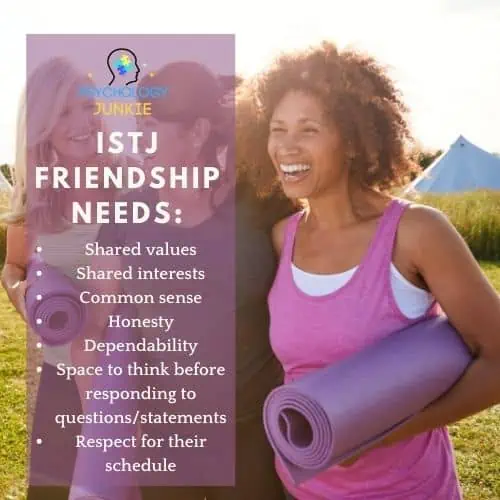
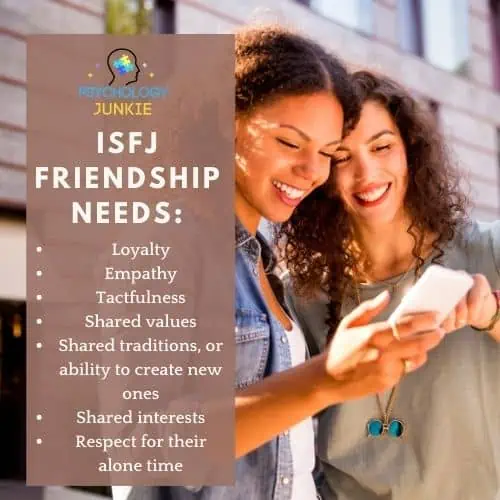
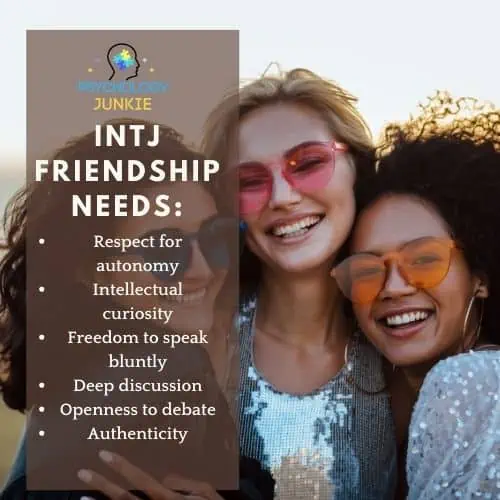
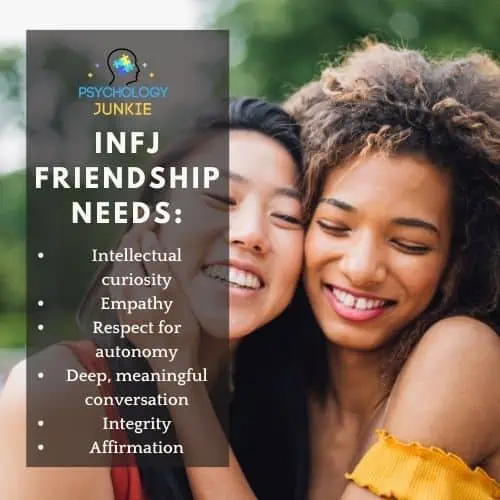
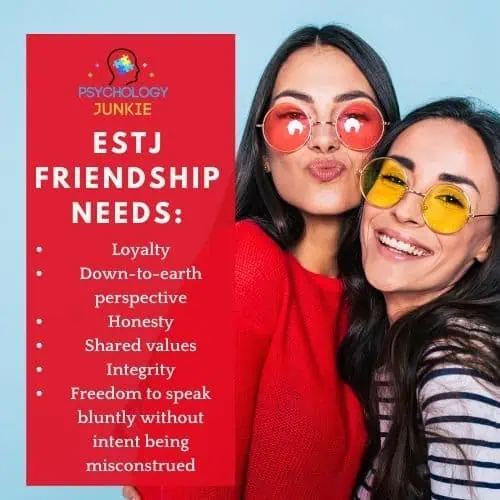
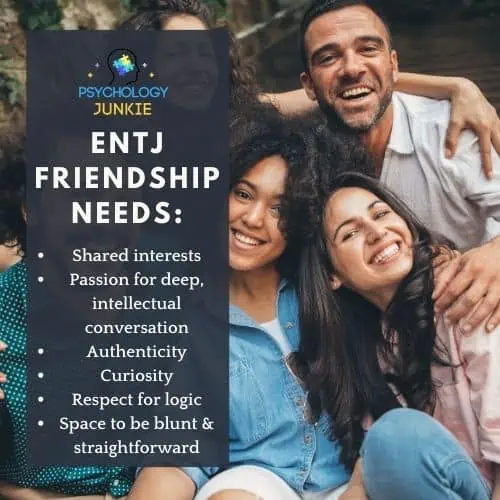
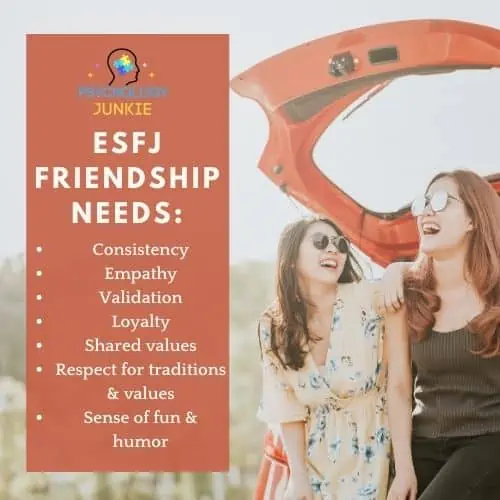
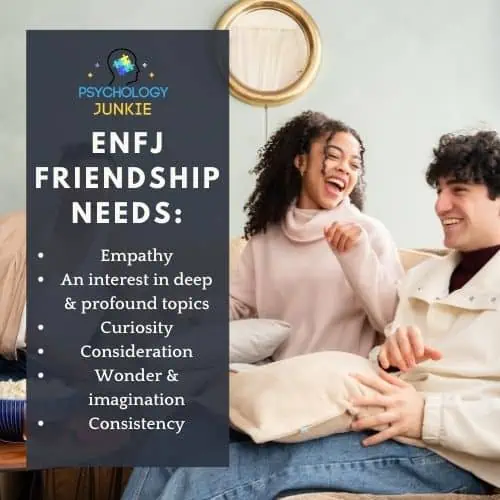
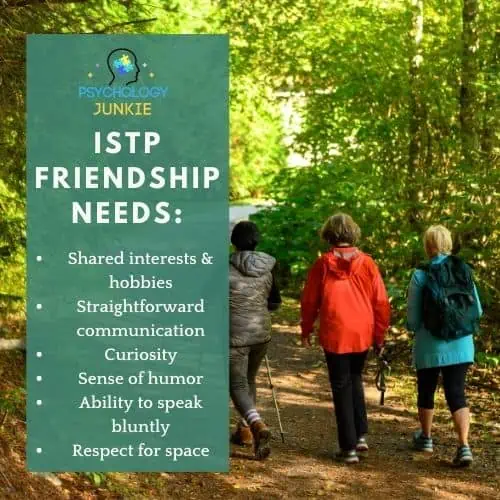
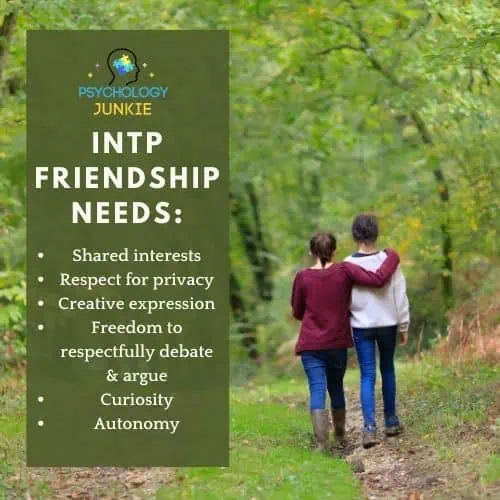
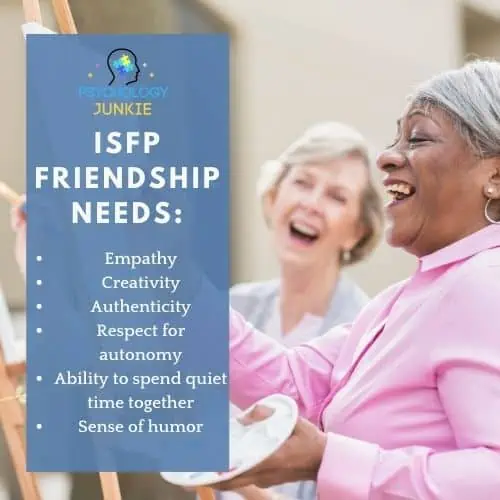
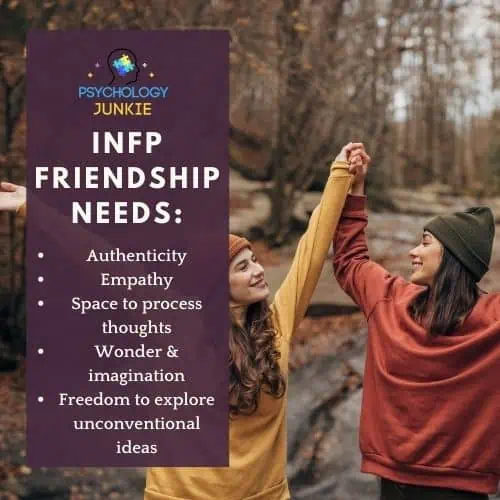
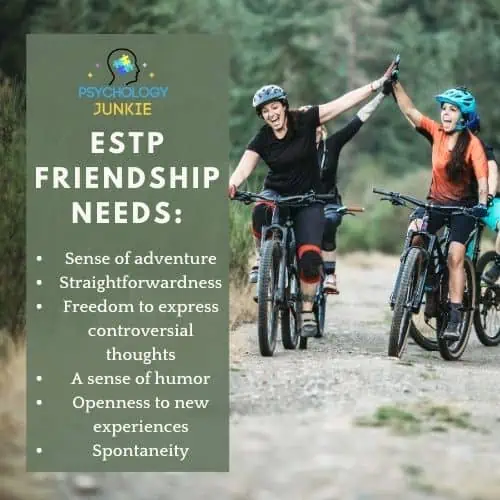
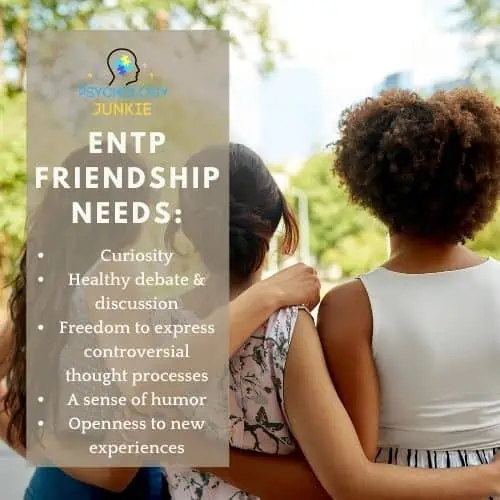
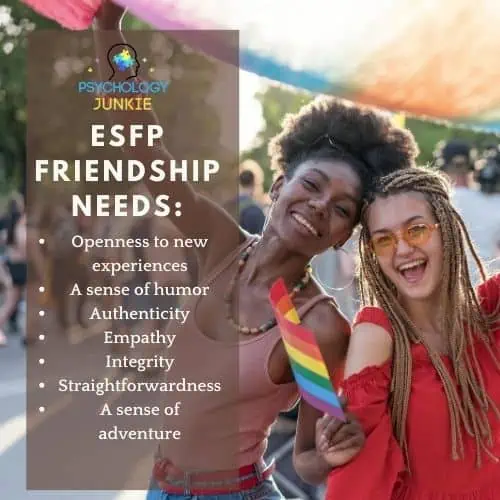
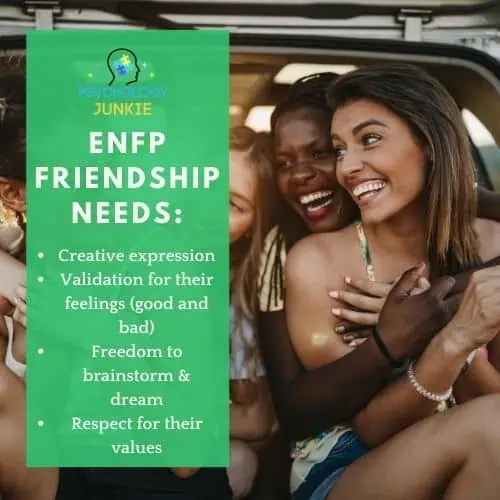


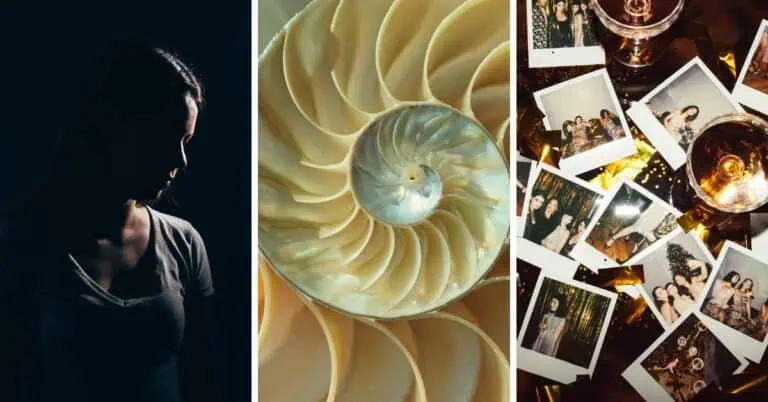




You didn’t do one for ENFJ!
Thank you SO much for alerting me to this! When I was copying this over from my word document I missed the ENFJ one, so I’ve fixed that now.
Wow. So detailed and accurate for INFJ, in every way, at least for me. 💕
Very nice. The INFJ one is sooooo relatable
The INTP descriptions have me pegged sooo well. I agree with at least 90% of each article. Sometimes I think I should just print these out on business cards in self defense:)
Hello Susan!
Thank you for that nice article! In what just as fun as always, but I’m a little bit confused. I’m not sure I understand why chose to consider only “women” and their friendships according to their types. I guess you are going to write about men’s friendships soon, but it surprised me to see this may need two different articles. Do you think people experience friendship that differently according to their gender? I never asked this to myself and I don’t know what it might involve, so I’m interested in reading your thoughts on this if you want.
Thank you again 🙂
Hi Félicie! I actually did write an article specifically for men before this one:) It’s here: https://www.psychologyjunkie.com/the-struggles-men-face-in-friendships-based-on-their-myers-briggs-personality-type/
And yes, I made two separate articles because I’ve found that there are unique struggles for men and women based on gender stereotypes and cultural expectations, particularly in the US. Thanks for the awesome question!
As a single INFJ woman, in my 50s, I have found that I just don’t try to maintain friendships anymore. I have a busy life and I don’t have the energy to be social and I enjoy my alone time more. I also find that I have not made new friends that I have anything in common with and I have outgrown my childhood friends so I just don’t have any friends that enjoy the same things as I do.